The cultural importance of bread and how we handle its waste today- a focus on bread cultures in Germany and Türkiye.
Hello! We are Maya, Georg, Andrea and Eloïse from the University of Leuphana in Lüneburg, Germany, and Serhan, Dilay, Yunus and Yiğit from the University of Trabzon,Türkiye . We have been working together in the framework of the Culture, sustainability and intercultural communication virtual exchange project. Fun fact: this project was realized without us ever having eaten bread together.
A first look – Eloïse
How often do you think about bread? And of that, how many times do you think of bread in any other way than as a sudden craving, breakfast staple or good accompaniment for soup? Not very often right? However, seemingly simple, bread is not only a good source of sustenance but has also had considerable historical, cultural, religious and political importance throughout human history. In the past, it has been central to consolidating societies, and it is ever present in our language and diet today. For example, in many societies such as the UK and Germany, the family provider is often referred to as the bread-winner. In Türkiye, if you find bread on the ground you are supposed to pick it up, put it somewhere safe and say a prayer. Bakeries abound in Germany. The average individual eats about 87 kg of bread per year, including breads like Vollkornbrot (whole grain bread) or smaller Brötchens (Lawford Mead Primary School). Think about yourself. How often do you eat bread? If “everyday” is your answer, it is for a lot of people!

However, as important as bread is, it falls victim to food waste just like any other food. As it is a very common source of sustenance, bread ends up in the top few contenders of every list for most wasted foods. In Türkiye alone, 45 thousand tons of bread go to waste yearly (Ben Rejeb et al., 2022), and in Germany, 1.7 million tons of bread are thrown out every year (Rushe, 2018). One of the many problems around such food waste is the generated methane by the rotting food in landfills (Hodgkins, 2022). Many other sustainability problems such as soil and water contamination (Environment, 2017) arise around food waste, which is why it is so crucial to find solutions to limit it.
In an effort to understand more about bread’s cultural importance and find ways to minimize its waste, we conducted interviews at local bakeries in two locations: Lüneburg, Germany, and Trabzon, Türkiye. Campaigns such as the redistribution of uneaten bread to those affected by poverty or educational tools to prevent food waste are part of the many solutions that came to light.
Bread and Culture – Georg and Eloïse
Across the relatively short period of time humans have been roaming earth, our habits, traits and customs have drastically changed. One thing that has remained consistent is the centrality of bread. Bread is one of the oldest human foods, still consumed today. It dates back to 12, 000 years ago in Neolithic time before humans became agricultural and it spread out rapidly across the globe over time (Britannica).
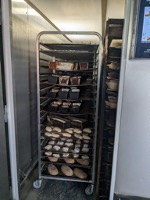
Although one can expect differences from one place to another, there are many things that remain consistent in the bread making world to this day. As mentioned before, we were given the privilege to interview the bakeries Gorele Ekmek Firini in Trabzon, Türkiye and Landbäckerei Oetzmann in Lüneburg, Germany. When talking with both bakeries, it became apparent how important bread is even today, and especially the process behind making it. Both bakeries still hold on tightly to the tradition of kneading their breads by hand, as well as baking them in stone-ovens. The value attributed to the hand making process is evident, not only is the tradition kept alive by these bakeries, but also by the customers who keep the bakeries going. Hand-made bread does sound more appealing, doesn’t it?
Even if the two bakeries do faithfully stick to traditional bread making methods, geographic and cultural differences occur and affect these methods. The variety of available bread-types in Germany is much higher than it is in Türkiye or the rest of the world. Today, the German Bread-Institute counts more than 3200 different bread-types in its register (Deutsches Brotinstitut e.V.). This variety can be explained by two general points: climate and political history. For one, rye is easier to grow in Germany due to its higher tolerance towards colder climate and sandy soils compared to wheat, which could be grown nicely in the world south from the Alps.
Secondly, the German territory consisted of many different small kingdoms until the formation of the German Confederation in 1815 (Bundesarchiv), which led to many small “countries” aiming for uniqueness, leading also to many variations in food and especially bread types (Deutsches Brotinstitut e.V.).
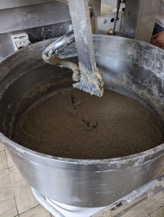
German bakeries may offer a huge variety of bread, but there is one kind that they lack, in which Turkish bakeries excel: unleavened bread.
They are made with a simple mixture of flour, water, and salt, which is kneaded and rolled out before baking. Since there is no leavening agent involved, unleavened breads have a denser and more compact texture compared to yeast breads. They also tend to have a more straightforward flavor profile, with the taste of the flour and other ingredients being more prominent. (Baker at Gorele Ekmek Firini)
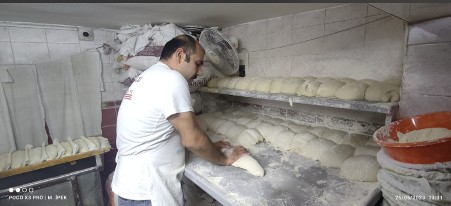
Additionally to the bread making itself, special traditions around bread and charity evolved in Türkiye. Askıda Ekmek, or in English Bread on hanger, is a Turkish tradition revolving around the five pillars of Islam, which Muslims believe need to be fulfilled to lead a good and moral life. One of those pillars is zakat, focusing on acts of charity, AskıdaEkmek being an example of that. Customers visiting a bakery can purchase two breads – one for themselves and the other left at the bakery to be collected by someone who cannot afford food otherwise (Morrow).
A similar concept has been applied in the bakery of Landbäckerei Oetzman. Every Saturday an organization from the neighboring village comes to collect leftover bread and gives them to people in need who could otherwise not afford it. These types of initiatives are spreading in Germany but remain (for now!) scarce.
A look at sustainability – Maya and Eloïse
What might catch your attention here is how a cultural habit or tradition can not only be beneficial to the less fortunate, but also to the planet. You might have encountered the Sustainable Development Goals, or SDGs. These goals have been defined by the UN to “provide[s] a shared blueprint for peace and prosperity for people and the planet, now and into the future” (United Nations). Linking these to the aforementioned traditions, you may have noticed that several of these goals are being addressed including the responsible consumption and production goal, reduced inequalities, climate action, and zero hunger goals. Bakery Oetzmann, for example, has almost zero waste in their production. How is this possible?
In addition to the previously mentioned leftover donation initiative, a lot of the bread that could not be sold is reused. This may come as a surprise to our readers, however, it is common knowledge in the bread making community. Old bread can be ground into breadcrumbs, which can then be reused in new doughs. Not only is food waste combated this way, but the flavor of your new dough is also enhanced and lasts longer. This can be explained by the capacity of breadcrumbs to bind more water and thus enabling bread to remain fresh for longer.
But what happens to the bread that is unfit for reuse in dough or overall human consumption. The answer is actually quite simple! Bread that is too old for human use can typically still be used as food for animals. If it is too old even for animal consumption, it goes to biogas factories, which are artificial systems where waste can be turned into sustainable energy and fertilizers (Homebiogas).
These two zero waste producing bakeries may sound like an exception, or even a hoax. Could it be possible that bakeries we have talked to are just very special? Where do the previously mentioned masses of bread-waste come from?
Most waste simply does not come from bakeries. We must admit, we only talked to small manufacturers, which means that the behavior around waste might be different in larger bakeries and chains. However, a majority of bread waste can be attributed to individual households, who miscalculate their needs and throw away their leftovers (Kuetscher, 2015).
According to the United Nations Environment Programme’s 2021 Food Waste Index, 931 million tonnes of food waste was generated in 2019, 61% of which came from households. Not only is this number ridiculously high, it also means serious consequences for the environment. An estimated 8-10 percent of global greenhouse gas emissions are associated with food that is not consumed (Forbes et al., 2021).
Germany finds itself in the top food wasters in the world in every sector including, retail, food service and households. Türkiye does not find itself on these lists but still holds significant food waste to its name.
All is not lost! – Andrea and Eloïse
With this knowledge, it is impossible to look away. We see now more than ever how the world is in need of global actions and solidarity. Luckily, we are not the only ones worrying about this. Around the world diverse groups of people are organizing themselves, building initiatives, creating NGOs and doing much more to take action. Similar to the acts of kindness and good faith in Türkiye with the Askıda Ekmek initiative, there are initiatives that connect the act of saving food with acts of care for the community.
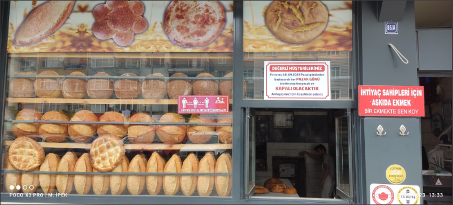
A well known initiative in Germany is Die Tafel. Die Tafel is an Umbrella-Organisation for 960 Tafeln, or food banks, nationwide, relying 100 percent on volunteers. They focus on collecting food from retailers and other companies and distributing it to people affected by poverty. In addition to this, they offer services such as warm meals, tutoring or childcare. Yearly, die Tafel redistributes around 250,000 tonnes of food, therefore being of great significance not only in reducing food waste, but also in helping the community (Tafel Deutschland).
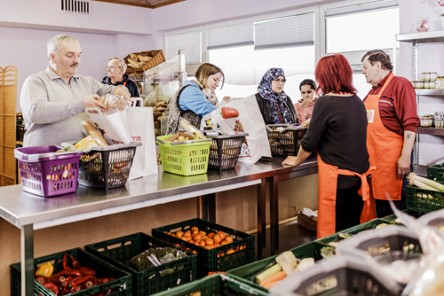
As the saying goes, caring is sharing. That is why the initiative Foodsharing.de is focused on collaborating with over 11.000 stores Germany-wide to collect food that would have normally been thrown out (foodsharing). Using the rescued food, they organize community dinners where the produce is processed and served for a small donation. This is a great opportunity to get together with people that share this motivation, or just as a great chance to have a tasty meal with friends and save some food!
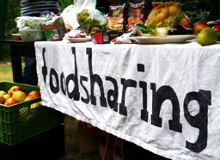
These big initiatives are great but can be somewhat intimidating for newbies in the field. Fear not! There are many other programs that provide resources to start with the change at home. The campaign “Zu gut für die Tonne!”– Too good for the bin!, is a program that is part of the National Strategy for Reducing Food Waste. They provide different educational resources to reduce food waste at an individual level (meal plans, storing food correctly, preserving, using leftovers, and many more!) (Zu gut für die Tonne).
This way, they make resources available for anyone interested in taking matters into their own hands starting at home. They also have the yearly Too Good for the Bin! Awards, rewarding outstanding projects that help reduce food waste. Last year (2022) Kultimativ GmbH: Heldenbrot won for the Agriculture and Production category. Heldenbrot is an initiative from Konstanz, Baden-Württemberg that buys leftover bread from bakeries to process it into bread granulate that can then be reused in a variety of products, like more bread!!!! (Zu gut für die Tonne).
Rye-ing to the challenge – Andrea and Eloïse
Although the food waste problem is a major one, there are solutions. Looking at the problem from its source and devising ways to curtail the issue at hand is an important place to start. Whether it is within an organization, as part of a governmental strategy, or simply with friends, neighbors and family, we can make small steps for a bigger future where all the bread produced is eaten, and everyone gets a piece. Informing yourself, helping out in your community and joining forces to reduce waste can be the driving force of a movement bigger than we can imagine. At the end of the day, our planet, and our bread, is what counts the most!
This blog was written by the students of Leuphana University with the support of the research done by Dilay Ulutaş and Yiğit Can Sezgin, and the interview from the Trabzon bakery carried out by Serhan Kurtal and Yunus Emre İpek.
References
Lawford Mead Primary School. Deutsches Brot -German Bread Did You Know ……? July 2015, https://www.lawfordmead.essex.sch.uk/blogs/year5/wp-content/uploads/sites/6/2021/01/German-Bread-Activity.pdf Accessed 4 July 2023
Ben Rejeb, Ines, et al. “Bread Surplus: A Cumulative Waste or a Staple Material for High-Value Products?” Molecules, vol. 27, no. 23, 1 Dec. 2022, p. 8410, https://doi.org/10.3390/molecules27238410. Accessed 23 June 2023.
Rushe, Elizabeth. “Germans Waste 1.7M Tonnes of Baked Goods Every Year, New WWF Study Finds.” Forbes, 6 Oct. 2018, https://www.forbes.com/sites/elizabethrushe/2018/10/06/germans-waste-1-7m-tonnes-of-baked-goods-every-year-new-wwf-study-finds/ Accessed 4 July 2023.
Hodgkins, Martha . “COP 27 Q&A: Food Systems & Agriculture in a Time of Global Crisis.” Unfoundation.org, 1 Nov. 2022, https://www.unfoundation.org/blog/post/cop-27-qa-food-systems-agriculture-in-a-time-of-global-crisis/?gclid=Cj0KCQjwho-lBhC_ARIsAMpgMofHvG8Jxo1xxiCE_w1f-_ogE-af9jz1u2fY7kq4lFhlol3rz87DfOsaAqlNEALw_wcB Accessed 4 July 2023.
Environment, U. N. (2017, September 26). Solid waste management. UNEP – UN Environment Programme. https://www.unep.org/explore-topics/resource-efficiency/what-we-do/cities/solid-waste-management#:~:text=Poor%20waste%20management%20%2D%20ranging%20from
Britannica. “Bread | Food | Britannica.” Encyclopædia Britannica, 2019, www.britannica.com/topic/bread
Deutsches Brotinstitut e.V. “Deutsches Brotinstitut E.V.” Www.brotinstitut.de, www.brotinstitut.de/
Bundesarchiv. “Bundesarchiv Internet – Deutscher Bund.” Www.bundesarchiv.de,www.bundesarchiv.de/DE/Navigation/Finden/Epochen/Deutscher-Bund/deutscher-bund.html.
Deutsches Brotinstitut e.V. “Historische Informationen · Brotkultur · Deutsches Brotinstitut E.V.” Www.brotinstitut.de, www.brotinstitut.de/brotkultur/historische-informationen.
Morrow, Lisa. “Turkey’s Ancient Tradition of “Paying It Forward.”” Www.bbc.com, 26 Nov. 2019, www.bbc.com/travel/article/20191125-turkeys-ancient-tradition-of-paying-it-forward#:~:text=money%20or%20provisions.-.
United Nations. “The 17 Sustainable Development Goals.” United Nations, 2015, https://sdgs.un.org/goals
Homebiogas. “What Is a Biogas Plant and How Does It Work?” HomeBiogas, 1 Nov. 2021, www.homebiogas.com/blog/what-is-a-biogas-plant-and-how-does-it-work/.
Kuetscher, Bernd. “Brotabfall: Was Passiert Mit Übrig Gebliebenem Brot (Brotabfällen) in Bäckereien?” Der Brotexperte: Alle Fakten Rund Um Brot, 18 Aug. 2015, www.brotexperte.de/brotmarkt/brotabfall/.
Forbes, Hamish, et al. “FOOD WASTE INDEX REPORT 2021 FOOD WASTE INDEX REPORT 2021.” UN Environment Programme, 2021, https://wedocs.unep.org/bitstream/handle/20.500.11822/35280/FoodWaste.pdf
Tafel Deutschland . “Die Tafeln: Lebensmittel Retten. Menschen Helfen.” Www.tafel.de, https://www.tafel.de/.
foodsharing. “Lebensmittel Teilen, Statt Wegwerfen – Foodsharing Deutschland.” Foodsharing.de, https://www.foodsharing.de/.
Zu gut für die Tonne. “Nationale Strategie Zur Reduzierung Der Lebensmittelverschwendung.” Www.zugutfuerdietonne.de, https://www.zugutfuerdietonne.de/strategie. Accessed 4 July 2023.
Pictures and Images:
Unless stated otherwise, all pictures were taken by the interviewers teams of this project.
Ekmeği, S. (n.d.). Yufka | Traditional Flatbread From Turkiye | TasteAtlas. Www.tasteatlas.com. Retrieved August 31, 2023, from https://www.tasteatlas.com/yufka
“25 Jahre Tafeln in Deutschland.” Www.tafel.de, https://www.tafel.de/ueber-uns/aktuelle-meldungen/2018/25-jahre-tafeln-in-deutschland. Accessed 4 July 2023.
“Vegan Leben Und Vegane Rezepte.” Deutschland Is(S)T Vegan, https://www.deutschlandistvegan.de/. Accessed 4 July 2023.


